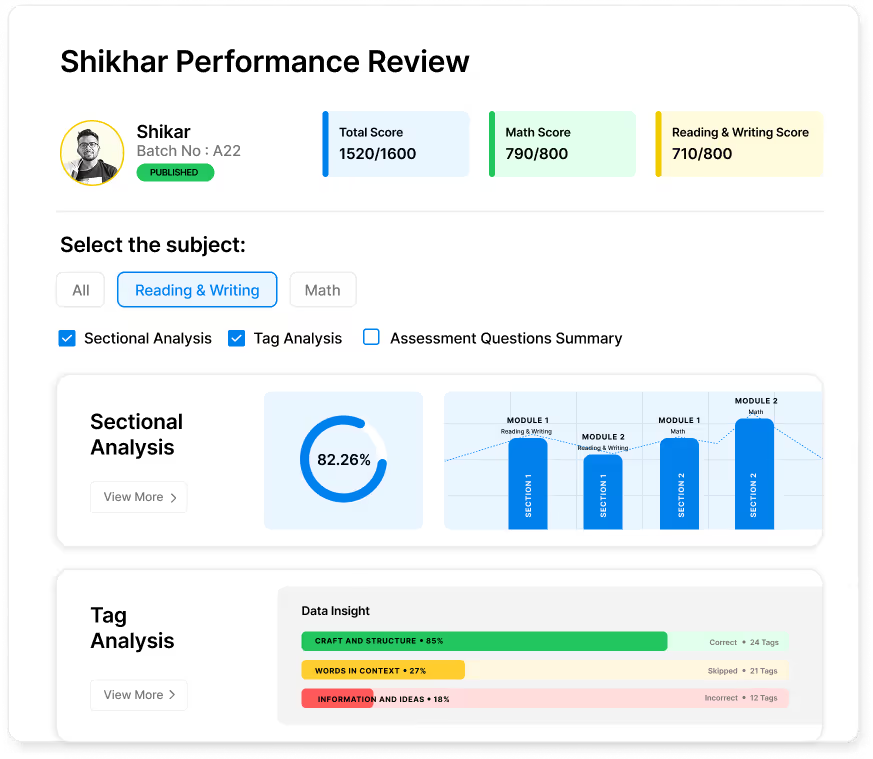




Key Takeaways
- Know the truth behind common ACT myths to avoid poor prep decisions.
- All ACT sections matter equally—don’t skip Reading or Science prep.
- Guessing never hurts your score—always answer every question.
The ACT is one of the most widely administered college entrance exams in the United States, with over 2 million students taking it every year. Designed to evaluate a student’s readiness for college-level work, the ACT plays a critical role in college admissions, scholarship opportunities, and course placement.
However, despite its widespread use, many students, parents, and even educators are often misled by common ACT myths and ACT test misconceptions. These misunderstandings can impact how students study, their level of confidence, and even their performance on test day.
Whether it’s the belief that guessing hurts your score or the assumption that certain sections are more important than others, these myths create unnecessary stress and lead to poor preparation decisions.
This guide is here to clear up the confusion. We’ll debunk the most common ACT myths, providing you with accurate information, context, and practical advice to help both students and educators navigate the test with clarity and confidence.
Myth #1: Colleges prefer the SAT over the ACT
Colleges and universities in the U.S. generally accept either the ACT or SAT, with no stated preference. Myths about preference (such as East Coast schools favoring the SAT) are not supported by admissions officers or official policies. Standardized testing policies typically state that both scores are treated equally in the admissions process.
In fact, many schools will superscore both tests, meaning they combine your highest section scores from multiple attempts, whether from the ACT or the SAT. When deciding between the two, consider which test aligns best with your strengths.
Key differences between the ACT and SAT
The ACT generally has a faster pace and includes a Science section, while the SAT gives a bit more time per question and emphasizes data interpretation and vocabulary in context. It’s a good idea to take a diagnostic test for both exams and choose the one that feels more intuitive for you.
Myth #2: The ACT is easier than the SAT
Another common myth is that the ACT is “easier,” but that is simply not the case.
The two tests are just different. The ACT emphasizes speed, with 215 questions packed into a little over three hours, which means you have to work fast.
ACT questions are often described as more direct, whereas SAT questions can be wordier or require more interpretation. However, the ACT’s faster pace and volume of questions require quick thinking.
The ACT may feel more approachable to students who are decisive and process information rapidly, while the SAT sometimes favors those with strong skills in multi-step reasoning and analysis.
For example, The ACT Reading section focuses more on main ideas, details, and "factual" recall, with fewer questions about tone and deeper literary analysis than the SAT. However, some ACT Reading questions may still require basic inference or consider the author's intent, though these are less prominent.
The section allots 35 minutes for 40 questions (10 per passage, four passages in total), which is just under 9 minutes per passage. This pace is faster and generally more demanding than the SAT’s allotted time for reading passages.
College counselors overwhelmingly recommend that students take diagnostic tests for both the ACT and SAT to determine which aligns with their abilities, rather than relying on hearsay or broad stereotypes.
Myth #3: Colleges don’t care about the ACT Anymore
Since the rise of test-optional policies, many students assume the ACT is no longer important. While it's true that some colleges do not require test scores, many still consider them, especially for competitive programs and scholarships. Note that while the majority of U.S. colleges remain test-optional, the percentage requiring the ACT is rising again among selective and public institutions.
More than 80% of U.S. four-year colleges are test-optional or test-blind for Fall 2025, but a significant number, including most highly selective and public flagship universities, now require SAT/ACT scores again. Even at test-optional schools, applicants can submit ACT scores, and these scores are considered if provided.
For example, merit-based aid often requires a minimum ACT score. Some programs in engineering, business, or honours colleges might still recommend or require test scores for placement or admissions. Even at test-optional schools, a strong ACT score can strengthen your application, especially if your GPA is borderline or if you are applying from a less-known high school.
So while you technically may not need the ACT, having a solid score can still make a big difference in your application. For highly selective schools and certain programs or scholarships, ACT scores are often required or strongly recommended.
Myth #4: If you have a high GPA, you don’t need to prepare
It is tempting to assume that if you have a 4.0 GPA, you will crush the ACT. But GPA and ACT scores don’t always correlate. While there is a positive correlation between high school GPA and ACT scores, it is not perfect, and many high-GPA students underperform or overperform on standardized tests.
Factors like grade inflation, varying grading standards, test-taking skills, and familiarity with standardized formats lead to inconsistencies. For example, correlations between GPA and ACT are typically moderate (correlation coefficients around 0.33–0.54, varying with school type), which means high GPA does not guarantee a high ACT score.
Students who ace classroom exams may struggle with ACT pacing or get thrown off by unfamiliar question formats. For example, ACT Math includes more geometry and data analysis than many high school math courses cover in depth. Likewise, the ACT Science section demands speed in interpreting graphs and experiments, not memorization. Pacing is a well-documented challenge for many students, regardless of classroom achievement.
Even high-achieving students benefit from practice tests, timed drills, and targeted prep.
Myth #5: Only English and Math matter
Because English and Math come first in the test order and often feel more familiar, some students assume they matter most. But The ACT composite score is the average of four equally weighted test sections: English, Math, Reading, and Science. Each section is scored on a scale of 1 to 36, and the composite score is the rounded average of these four scores.
English and Math do come first in the test order, which can create a false impression of their greater importance, but all four sections contribute equally. Because the composite score averages all four sections equally, poor performance in Reading or Science will lower the overall ACT composite score, regardless of strengths in English or Math.
The Science section, for example, often throws students off because they expect it to test science knowledge. The ACT Science section primarily tests scientific reasoning, data analysis, and interpretation skills, rather than recalling scientific facts. It uses graphs, tables, and experimental setups to ask students to analyze information logically. This is widely confirmed by ACT test descriptions and prep resources.
Neglecting preparation for the Science section often results in a lower score in that section, which will hurt the overall composite. Because it counts equally, underestimating its importance is indeed a common and consequential error.
Given the equal weighting and the distinct skill sets each section tests, preparing thoroughly for all four sections is essential to maximize your ACT score.
Myth #6: There’s a penalty for guessing the answers
This myth is leftover from older versions of standardized tests like the SAT, which used to deduct points for wrong answers. The original SAT (prior to 2016 redesign) employed a guessing penalty, deducting a fraction of a point for incorrect answers to discourage random guessing. The ACT has never had a guessing penalty.
The ACT scoring is based solely on the number of correct answers. There is no point deduction for wrong answers or unanswered questions. This is explicitly stated on the official ACT website and widely confirmed by test prep resources.
Because there is no penalty for guessing, it is strategically advantageous to answer every question, guessing when necessary. Leaving bubbles blank results in guaranteed no credit, whereas guessing provides at least a chance for a correct answer.
Test-taking advice from ACT and prep experts like EdisonOS recommends filling in any unanswered questions when time is about to expire to maximize your potential score.
EdisonOS’s real-time drill analytics can help you spot the types of questions that slow you down so you can speed up and reduce the need for blind guessing.
Myth #7: You need a perfect score to stand out
A perfect ACT score of 36 is very rare and certainly impressive, but it is not required for admission to most colleges, including selective institutions. Admissions officers consider many factors beyond test scores, such as GPA, essays, extracurriculars, and recommendations.
Many admitted students at top schools score well below 36, often in the 30–34 range. The belief that only perfect scores are competitive is a common misconception. In reality, admissions are holistic, and near-perfect scores combined with other strengths make students highly competitive.
Most colleges use holistic admissions, where standardized test scores are one component of the application portfolio. A 30+ ACT score is above the national average and often well within or above the middle 50% range for many competitive colleges.
ACT uses a scaled scoring system, so the raw score (number of questions answered correctly) converts to a scaled score from 1 to 36 based on test difficulty and curve. It is common for students to earn a 36 even if they miss one or sometimes two questions, depending on the particular test’s curve.
We advise focusing on continuous improvement, realistic practice, pacing, and targeting scores that realistically meet or exceed admission requirements for desired schools. Obsessing over perfection can lead to burnout without meaningful benefit.
How ACT myths lead to bad prep decisions
Misconceptions about the ACT don’t just cause confusion—they can waste valuable time, increase anxiety, and leave you underprepared. For example, believing you can skip studying for the Reading or Science sections can negatively impact your composite score.
Thinking that guessing will hurt your score might lead you to leave questions unanswered, which can hurt your score even more. Relying solely on your GPA can lead to unpleasant surprises on test day, as the ACT is a separate measure of college readiness.
Having accurate information is one of the most powerful tools in your prep arsenal. It allows you to make smarter decisions, create more effective study plans, and approach test day with greater confidence.
What you should know: key facts
Here are some essential takeaways for every ACT test-taker:
- The ACT is accepted by all U.S. colleges that require a test score.
- All four sections contribute equally to your composite score.
- There is no penalty for guessing.
- A strong ACT score can enhance your scholarship applications.
- A high GPA does not necessarily correlate with a high ACT score.
- Prep tools like EdisonOS can help you track your progress in real time.
How EdisonOS helps students prep smarter
EdisonOS offers a digital ACT experience that closely mirrors the actual digital ACT format. The platform comes with practical and helpful features, including:
- Test interface with tools like a calculator, flagging, a timer, and navigation
- Accurate scoring chart and question behaviour
- Support for hybrid (paper + online) practice modes
- Second-by-second analytics to track timing and performance

For example, students can complete a timed English section and instantly see how long they spent per question, which ones they flagged, and where they lost time. EdisonOS converts this data into actionable insights. Tutors and students alike can then tailor their next study session to focus on those pain points.
As one of our users, Najeeb Shaik from The Edge Learning Center, shared,
“EdisonOS transformed our outdated paper system with its flexible, customizable platform. Love it!”
The bottom line
The ACT is challenging, but it doesn’t have to be confusing. Misinformation only adds stress and leads to ineffective preparation. By replacing myths with facts, you can boost your confidence—and improve your scores.
Stay informed, trust your data, and use reliable tools like EdisonOS to practice in a way that closely mirrors the real test experience. With the right approach, you'll walk into test day feeling clear, in control, and confident in your ability to perform your best.
Ready to start smarter prep? Explore EdisonOS today.
Frequently asked questions
Tutors Edge by EdisonOS
in our newsletter, curated to help tutors stay ahead!
Tutors Edge by EdisonOS
Get Exclusive test insights and updates in our newsletter, curated to help tutors stay ahead!
Recommended Reads
Recommended Podcasts






.png)




.png)
.webp)
